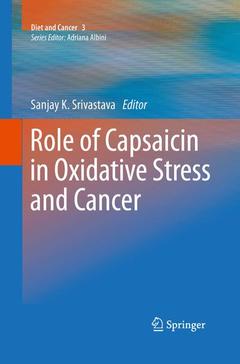Description
Role of Capsaicin in Oxidative Stress and Cancer, 2013
Diet and Cancer Series, Vol. 3
Language: English
Subjects for Role of Capsaicin in Oxidative Stress and Cancer:
Keywords
Cancer; Capsaicin; Oxidative stress; Prevention; Therapy; Apoptosis; gene expression
Publication date: 05-2015
Support: Print on demand
Publication date: 05-2013
178 p. · 15.5x23.5 cm · Hardback
Description
/li>Contents
/li>Comment
/li>
Preface.- Role of capsaicin in cancer prevention.- Role of death receptors belonging to the TNF family in capsaicin-induced apoptosis of tumorcells.- Role of capsaicin in prostate cancer.- Capsaicin and the urinary bladder.- Inhibition of pancreatitis and carcinogenesis by capsaicin.- Cytochrome P450-dependent modification of capsaicinoids: pharmacological inactivation and bioactivation mechanisms.- The cancer suppressing and promoting actions of capsaicin.- Oxidative stress by capsaicin in cancer.




